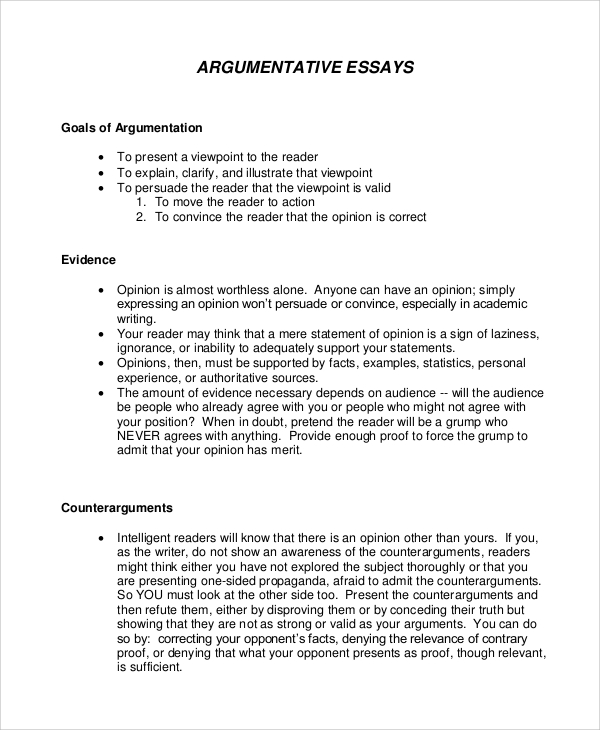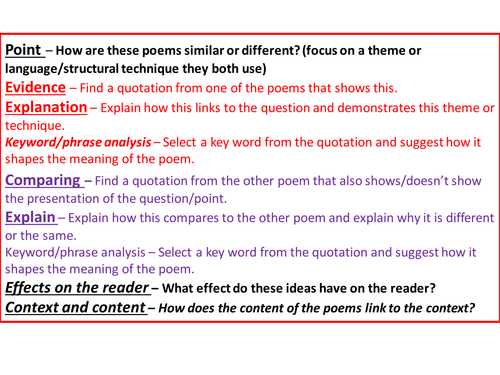
13/06/ · An argumentative essay is an essay that uses evidence and facts to support the claim it’s making. Its purpose is to persuade the reader to agree with the argument being An Argument Essay argues for a position, which is usually stated in the Introduction. It may consider and refute (explain the weakness in) opposing views. The position is usually restated 7/03/ · An argument is a deliberate attempt to move beyond just making an assertion. When offering an argument, you are offering a series of related statements which represent an
How to Write an Argumentative Essay - Bay Atlantic University - Washington, D.C.
When people create and critique arguments, what is a argument essay, it's helpful to understand what an argument is and is not. Sometimes an argument is seen as a verbal fight, but that is not what is meant in these discussions. Sometimes a person thinks they are offering an argument when they are only providing assertions. This may have been a comedy sketch, but it highlights a common misunderstanding: to offer an argument, you cannot simply make a claim or gainsay what others claim. An argument is a deliberate attempt to move beyond just making an assertion. When offering an argument, you are offering a series of related statements which represent an attempt to support that assertion — to give others good reasons to believe that what you are asserting is true rather than false.
Here are examples of assertions:. Sometimes you hear such statements referred to as propositions. Technically speaking, a proposition is the what is a argument essay content of any statement or assertion. To qualify as a proposition, a statement must be capable of being either true or false. The above represent positions people hold, but which others may disagree with. Merely making the above statements do not constitute an argument, no matter how often one repeats the assertions. To create an argument, the person making the claims must offer further statements which, at least in theory, support the claims. If the claim is supported, the argument is successful; if the claim is not supported, what is a argument essay, the argument fails. This is the purpose of an argument: to offer reasons and evidence for the purpose of establishing the truth value of a proposition, which can mean either establishing that the proposition is true or establishing that the proposition is false.
Another aspect of understanding arguments is to examine the parts, what is a argument essay. An argument can be broken down into three major components: premisesinferencesand a conclusion. The claim, in turn, is the conclusion: what you finish with at what is a argument essay end of an argument. When an argument is simple, you may just have a couple of premises and a conclusion:. Inferences are the reasoning parts of an argument. Conclusions are a type of inference, but always the final inference. Usually, an argument will be complicated enough to require inferences linking the premises with the final conclusion:. Here we what is a argument essay two different types of claims which can occur in an argument. The first is a factual claim, and this purports to offer evidence.
The first two premises above are factual claims and usually, not much time is spent on them — either they are true or they are not. The second type is an inferential claim — it expresses the idea that some matter of fact is related to the sought-after conclusion. This is the attempt to link the factual claim to the conclusion in such a way as to support the conclusion. The what is a argument essay statement above is an inferential claim because it infers from the previous two statements that doctors can travel a lot. Without an inferential claim, there would be no clear connection between the premises and the conclusion. It is rare to have an argument where inferential claims play no role. Assuming such inferential claims really are there, what is a argument essay, you will be spending most of your time on them when evaluating and critiquing an argument.
If the factual claims are true, it is with the inferences that an argument will stand or fall, and it is here where you will find fallacies committed. But every argument which really is an argument should be capable of being reformulated in such a manner. If you cannot do that, then it is reasonable to suspect that something is wrong. Share Flipboard Email. By Austin Cline Austin Cline. Austin Cline, a former regional director for the Council for Secular Humanism, writes and lectures extensively about atheism and agnosticism. Learn about our Editorial Process. Cite this Article Format. Cline, Austin. What Is an Argument?
copy citation. Featured Video. Fallacies of Relevance: Appeal to Authority. Logical Fallacies: Begging the Question. How Logical Fallacy Invalidates Any Argument. Argumentum ad Populum Appeal to Numbers. Oversimplification and Exaggeration Fallacies. Argument Against the Person - Argumentum Ad Hominem. Hypostatization Fallacy: Ascribing Reality to Abstractions. Tu Quoque - Ad Hominem Fallacy That You Did It Too. Understanding the "No True Scotsman" Fallacy.
How To Write an Argumentative Essay (Definition + Topics + Outline) - EssayPro
, time: 6:31What Is an Argument?

A demonstration of your ability to use or apply the material in ways that go beyond what you have read or heard. This second part can be done in many ways: you can critique the material, What is an argumentative essay? The argumentative essay is a genre of writing that requires the student to investigate a topic; collect, generate, and evaluate evidence; and establish a 27/11/ · What Is an Argumentative Essay? An argumentative essay is designed to convince the reader why your stance is correct by expanding on the topic and offering fact-based

No comments:
Post a Comment